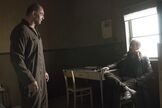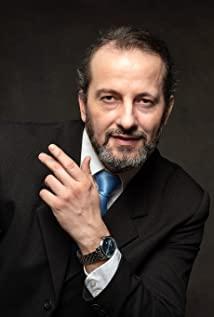Notice! ! ! Serious spoilers! ! ! ! ! ! ! ! ! ! ! !
A year ago, I went to the studio of "Blade Runner 2049" and found an old book-Nabokov's "Dark Fire" among the props on a shelf. At that time, I was very curious about the relationship between this book and the movie, and the mystery was not revealed until the movie was released a full year later. Moreover, the meaning of this book does not seem to be simple.
This book appeared in the home of K played by Commander High. There was a scene where Joi wanted K to read the book to her, but K refused, on the grounds that "you don't like this book".
The paragraphs in this book appeared in the "Baseline Test" that K experienced in the police station. He mentioned the verses in the book twice.
Let me talk about what this book is all about first. Russian-American writer Vladimir Nabokov's "Pale Fire" was published in 1962, and that was after his "Lolita" became popular in the United States. After the publication of "Dark Fire", it gained the praise of critics and was considered to have broken through the form of the novel.
Nabokov fictionalized a professor and poet Shade, and his colleague and neighbor Kinbote. After the death of the poet, he left an autobiographical 999-line poem, and The neighbor wrote the foreword, commentary, and index for the long poem.
Its structure is indeed very peculiar, with long poems accounting for only one-tenth of the whole book, but the commentary is very lengthy and cumbersome. The main long poem talks about the life of the poet, his dead daughter, his understanding of life, love, death, reality and illusion, and so on. Through a long commentary, the neighbor forcibly reversed the meaning of the poem and turned it into a story about the last king from Zambala (a fictional country). This neighbor may be the deposed king, who fled to the United States and taught under the pseudonym Golden Porter to teach in school, and wanted the poet to write his own experience in his poem. It is also possible that he fantasized himself as the fictional king in the process of far-fetched and chasing after the wind.
"The dim fire" comes from the Shakespeare tragedy "Tim of Athens", which refers to the moon as a thief, and obtains the "dimmed fire" by absorbing the sun's light source. Nabokov used this to mock the neighbor that he is the moon, stealing light from the poet.
Speaking of this, do you feel a little familiar? In the process of carrying out the mission, K thought that he was the "miracle" and the "son of the heavenly chosen", but in the end he discovered that the "son of the heavenly chosen" was someone else. Of course, he is different from the neighbors in "Dark Fire" in that he was misled and regarded as a "suspect trick". But one person's experience is real, while the other's experience is illusory; one person sees himself as another person... still makes me feel very similar.
And Kim Porter's "re-creation" of the art form of "poetry" also corresponds to K now owns and falls in love with another human creation product-holographic girlfriend Joi. So this may be a side-by-side explanation of why Joi "dislikes this book" , which seems to remind her: She is completely artificial, given content by the creator, and even worse than a copy.
Another coincidence is that in the index of "Dark Fire", neighbor Kinbote uses "K" to refer to himself and "S" to refer to poet Shade. In "Blade Runner 2049", Gosling's role is called "K", and Deka's real daughter is Stelline-K and S.
Let's take a look at the Baseline of Officer K. A note in the film mentioned that the baseline test is a post-traumatic test; Gosling explained in the art manual of this film, "The baseline is to test the impact of Blade Runner’s work on his brain and psychology, because They are going to hunt down their own kind, so they have to constantly undergo evaluation to see if their work has caused them a mental shock."
And the key part of K's baseline test content is an excerpt from the third chapter of the long poem in "Dark Fire":
"Blood-black nothingness begins to weave
A network with cells connected
Connect again, connect again with that main trunk.
So against the darkness,
A fountain of white water spouting upward appears. "
(This paragraph and the book translations quoted below are all from the translator: Mei Shaowu, Shanghai Translation Publishing House)
original:
And blood-black nothingness began to spin
A system of cells interlinked within
Cells interlinked within cells interlinked
Within one stem. And dreadfully distinct
Against the dark, a tall white fountain played.
Excluding this paragraph alone, it is difficult to understand what it means. But when it comes to context, its meaning becomes clear.
This is the poet describing his near-death experience. He is convinced that he has "crossed the border" and walked through the ghost gate. But his doctor thought he had only hallucinations and never died once. In this experience of the poet, "a tall white fountain" is a key image.
Later, the poet encountered another strange thing: "I came across what seemed a twin display" (I came across what seemed a twin display). He saw a woman’s deeds in a magazine. She was rescued after a heart attack. He described to reporters the "post-death state" she saw. Among them, she saw an orchard with "a tall and white tree." "A tall white fountain". So the poet was shocked. He quickly contacted the reporter who wrote the article, asked for the lady's address, and drove to visit her. But he did not discuss the "white fountain" in depth with her, the reason is:
"I could have asked her to talk more about us
The white fountain I saw in the "world after death".
But (I think) if I bring up that detail,
She will pounce, as if catching something gratifying
Intimacy, a sacred union,
Connect her and me mysteriously,
Our souls will be like
Brother and sister on the edge of that sensitive incest
Trembling. "
Later, the poet went to the reporter who interviewed the lady, but he told the poet that there was an uncritical misprint in this article-it was a mountain instead of a fountain. In other words, what the poet saw when he was dying was a "white fountain", while what the lady saw was a "white mountain" , which was different. So the poet was once again shocked by the soul, thinking that there was a sacred connection between the two, but in the end discovered that it was just an insignificant misunderstanding.
Isn't this what happened to K in "Blade Runner 2049"? At one time I thought I was a "chosen son", but finally realized that it was just a misunderstanding. And the misunderstanding of "White Fountain" in "Dark Fire", in which the descriptions of "twin" and "brother and sister" are reminiscent of boys and girls born on the same day in the movie, with the same genes, K and Dr. Stelline A relationship like twin siblings.
So far, there is no explanation of the film's creator for "Dark Fire", but regardless of whether it meets my above-mentioned over-interpretation (crossed out), "Dark Fire" is a maze-like book with rich connotations. A book that can be interpreted from different angles. Similarly, different audiences can chew different flavors from "Blade Runner 2049". This is probably the similarity between the two.
View more about Blade Runner 2049 reviews










